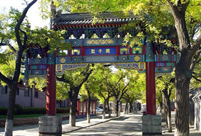 Global ambassadors of ecotourism gather in Nanjing
Global ambassadors of ecotourism gather in Nanjing
 Taiwan woman marries into Kazak family, 100 sheep plus a flat as dowry
Taiwan woman marries into Kazak family, 100 sheep plus a flat as dowry
 College girls take graduation photos under water in Chongqing
College girls take graduation photos under water in Chongqing
 Cartoon: Xi and football
Cartoon: Xi and football
 Chinese influence sweeps ROK
Chinese influence sweeps ROK
 Post-90s beauty boxer grapples four men
Post-90s beauty boxer grapples four men
 3,000-year-old tea town through lenses
3,000-year-old tea town through lenses
 22 archaeological sites along Silk Road in China
22 archaeological sites along Silk Road in China
 Football babies, Samba dancers embrace 'World Cup'
Football babies, Samba dancers embrace 'World Cup'
 Beautiful scenery along China’s Grand Canal
Beautiful scenery along China’s Grand Canal
BEIJING, July 8 -- The world's largest two economies are about to inject new vigor into their cooperation as the sixth round of China-U.S. Strategic and Economic Dialogue (S&ED) is set to open on Wednesday.
But before the curtain is raised, some on the U.S. side already poured cold water on the talks, with Treasury Secretary Jack Lew's fact-twisting and politically misleading remarks that an undervalued renminbi would top the dialogue and is a threshold issue fundamental to mutual trust.
Lew's complaint seems to be pointing to the fact that the renminbi has depreciated over 2 percent against the U.S. dollar in the first six months of this year.
However, that was compared to a staggering 36 percent rise since July 2005, when China launched bold reforms to gradually free up its exchange rate mechanism.
The recent currency depreciation, in fact, is not targeted at boosting exports. On the contrary, it was another step toward a more flexible exchange rate, as the central bank encouraged two-way fluctuation of the renminbi exchange rate.
Moreover, Chinese authorities widened the daily trading band of the currency in March, increasing the amount renminbi is allowed to rise or fall each day from 1 percent to 2 percent.
All these meaningful steps in the right direction have been overlooked by U.S. politicians, whose fixation on the value of the renminbi has grown tiresome and outdated both technically and politically.
China's current account surplus, which American lawmakers say largely reflects undervaluation of the renminbi, has fallen from more than 10 percent relative to Chinese GDP in 2007 to 2 percent in 2013.
The value of the renminbi is now very close to its equilibrium. Currency depreciation, at this stage of China's economic development, is no longer an attractive policy tool, as it would only hamper structural reforms and worsen trade imbalances.
No matter how committed Beijing is to currency reforms, this formidable mission can't be completed overnight. China will not bow to external pressures, but has to stick to its own steady pace in allowing a more flexible renminbi, or the yuan.
Meanwhile, playing up China's currency issue has become a favored political tactic for U.S. politicians in order to gather more votes and deflect attention from domestic woes.
But many U.S. citizens have come to realize that American trade deficit and unemployment have little to do with the Chinese currency. Only America can put its own house back to order.
China-U.S. relations have entered a new era of opportunity and cooperation. To foster a new type of major-country relations, the two countries, as Chinese President Xi Jinping told former U.S. Treasury Secretary Henry Paulson last week, need to "plant more flowers, not thorns" in their relationship.
 'Seattle's soulmate' - -Pike Place Market
'Seattle's soulmate' - -Pike Place Market Human skeletons of more than 1,600 years old
Human skeletons of more than 1,600 years old BFA goddess poses for graduation photos
BFA goddess poses for graduation photos Separate college entrance exam
Separate college entrance exam Flash mob dance
Flash mob dance Featured hutongs in Beijing
Featured hutongs in Beijing Picturesque scenery of Ghost City
Picturesque scenery of Ghost City Female special assault team in training
Female special assault team in training Children attend First Writing Ceremony
Children attend First Writing Ceremony Chengdu police use social media to boost recruitment
Chengdu police use social media to boost recruitment Secrets unveiled in restoration of the 800-yr-old Buddha
Secrets unveiled in restoration of the 800-yr-old Buddha Heavenly path in Chongli grassland
Heavenly path in Chongli grassland Happy Birthday to "Yuanzai"
Happy Birthday to "Yuanzai" China's manned submersible Jiaolong opens to public
China's manned submersible Jiaolong opens to public Roast Duck Restaurant celebrates 150th anniversary
Roast Duck Restaurant celebrates 150th anniversaryDay|Week|Month